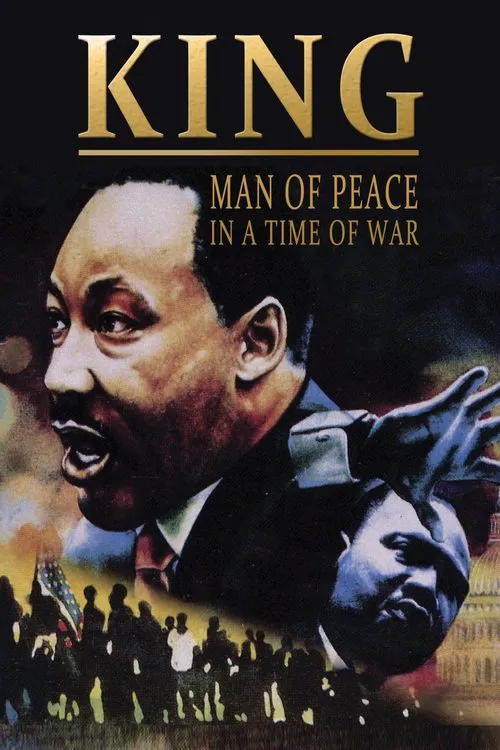King: Man of Peace in a Time of War

Plot
The documentary "King: Man of Peace in a Time of War" delves into the complexities of Martin Luther King Jr.'s life, focusing on his tireless efforts to bring about peace and equality amidst the turmoil of the 1960s. As the United States found itself embroiled in the Vietnam War, King and his followers continued to fight for civil rights, often navigating the treacherous waters of social and political upheaval. The film opens with an examination of King's rise to prominence, tracing his journey from a young minister at the Dexter Street Baptist Church in Montgomery, Alabama, to becoming one of the most recognizable figures in American history. With the help of insightful interviews from contemporaries and experts like Jesse Jackson and Colin Powell, the documentary sheds light on King's unwavering commitment to nonviolent resistance and his determination to bring people together across racial and ideological divides. King's involvement in the Vietnam War protests serves as a pivotal aspect of the documentary, highlighting the contradictions and challenges he faced within his own movement. As anti-war sentiment grew, many of King's allies within the Civil Rights Movement began to diverge from his stance on the war. Some, like the Student Nonviolent Coordinating Committee (SNCC), began to take a more radical approach, often questioning King's leadership and his commitment to anti-war activism. However, King remained steadfast in his opposition to the war, seeing it as an affront to American values and a destructive force that perpetuated suffering and violence. One of the documentary's strengths lies in its thoughtful integration of expert perspectives, offering a nuanced understanding of King's actions within the broader context of international relations and military strategy. Colin Powell, a former Joint Chiefs of Staff chairman, provides valuable insights into the complexities of military intervention, while others offer perspectives on the impact of the war on local Vietnamese populations. These insights serve to underscore the gravity of King's position, highlighting the difficult choices he faced and the consequences of his decisions. Jesse Jackson's personal recollections add a touching and intimate dimension to the documentary, as he reflects on the mentorship and leadership provided by King during the tumultuous 1960s. Jackson recalls King's unwavering dedication to nonviolent resistance, often risking his own life to confront violence and hate with love and compassion. Through these personal anecdotes, the documentary humanizes King, revealing a man who struggled with his own doubts and fears while remaining resolute in his commitment to justice and equality. King's personal struggles and the turmoil within his own movement serve as a poignant backdrop to the film's exploration of the 1963 March on Washington for Jobs and Freedom. Often remembered as the site of King's iconic "I Have a Dream" speech, the event itself was a watershed moment in American history, bringing together hundreds of thousands of people from across the country to demand equal rights and an end to segregation. As the documentary progresses, it delves into King's later years, highlighting the mounting criticism he faced from various quarters. The FBI's infamous COINTELPRO program aimed to discredit King through surveillance and harassment, while right-wing groups and individuals sought to silence him through intimidation and violence. Undeterred, King continued to organize and mobilize, becoming an increasingly vocal critic of systemic inequality and militarism. The film culminates in a reflection on King's assassination in 1968, as he stood on the balcony of the Lorraine Motel in Memphis, advocating for the rights of black sanitation workers on strike. The documentary ends with a poignant silence, underscoring the loss of a great leader and a symbol of nonviolent resistance. Through "King: Man of Peace in a Time of War," viewers are invited to reflect on the enduring legacy of a man who embodied courage, compassion, and conviction, even in the face of overwhelming adversity. In the end, this documentary serves as a powerful tribute to Martin Luther King, highlighting the complexities and challenges of his work as he navigated the dark waters of the 1960s. Through its thoughtful examination of King's actions and motivations, the film reminds viewers of the ongoing relevance of his message, urging us to continue striving for justice, equality, and peace in a world that often seems to prioritize division and conflict.
Reviews
Recommendations


